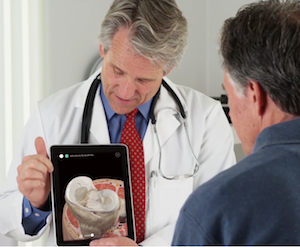 Even the tiniest view of a surgical procedure can be too much for non-medical professionals, but for actual surgeons, more visibility is a real asset. But there is only so much to be seen with the naked eye, so medical navigation technology and mixed reality company Scopis has launched a new tool to give surgeons enhanced visibility when performing spinal surgery.
Even the tiniest view of a surgical procedure can be too much for non-medical professionals, but for actual surgeons, more visibility is a real asset. But there is only so much to be seen with the naked eye, so medical navigation technology and mixed reality company Scopis has launched a new tool to give surgeons enhanced visibility when performing spinal surgery.
By merging the capabilities of Microsoft HoloLens with their surgical navigation platform, Berlin, Germany and Cambridge, Massachusetts-based Scopis has developed the Holographic Navigation Platform. By donning a pair of the HoloLens glasses, surgeons can see a 3D overlay of the pre-planned positioning of screws, allowing the surgeon to interactively align their instruments with the holographic visualization and find the proper location more quickly. Additionally, surgeons can keep their eye on the operative field, and they can also used gestures to place virtual monitors onto their visual field.
“Scopis’ Holographic Navigation Platform is a universal solution that offers specific advantages for spinal surgeries and can also be applied in the many other areas where the highest levels of precision and speed are critical. In neurosurgery, for example, brain tumors could be located faster and with higher accuracy,” Scopis CEO and founder Bartosz Kosmecki, said in a statement. “The development of this holographic platform further highlights Scopis’ leading role in medical mixed and augmented reality.”
The holographic platform also seeks to work in the place of fluoroscopy devices, which are used today to determine screw placement positioning but have the negative side effect of radiation exposure to the patients and medical professionals.
 In other three-dimensional surgical technology news, Dublin-based 3D4Medical, which makes apps for medical education and fitness, unveiled its new suite of the clinical apps for iPhone and iPad collectively called Compete Consultation. The idea is to facilitate conversation and education between doctors and their patients on a range of areas including orthopedics, cardiology, internal medicine and trauma.
In other three-dimensional surgical technology news, Dublin-based 3D4Medical, which makes apps for medical education and fitness, unveiled its new suite of the clinical apps for iPhone and iPad collectively called Compete Consultation. The idea is to facilitate conversation and education between doctors and their patients on a range of areas including orthopedics, cardiology, internal medicine and trauma.
Previously, the company launched a version of the app in 2013, but only to the largest and most familiar hospital chains in the United States. Now, orthopedic surgeons and clinics around the world will have access, and the app is free to the general public.
With 3D technology and animations, Complete Consultation is intended to help healthcare professionals more thoroughly educate their patients, allowing them to give visual pointers on anatomy of the part of the body in question, potential pathologies and treatments (including step-by-step animations).
Maurice Neligan, director of Orthopedic Surgery at Ireland’s Beacon Hospital and associate clinical professor at University College Dublin School of Medicine, pointed to the technology as a “significant advancement in engaging patients.”
“It dispenses with the need for plastic models and scribbled diagrams, replacing them with top-quality illustrations, animations, and information that are personalized to the patient’s pathology and treatment,” Neligan said in a statement. “It is well-known that better-engaged patients have better outcomes and the information generated from patient engagement with Complete Ortho allows a more robust consent process for treatment, lowering the risk of malpractice litigation and the process can be seamlessly incorporated into existing practice models with little or no increase in consultation time.”
We last heard from 3D4Medical in mid-2015, when the company raised $16.4 million. 3D4Medical's flagship app, called Essential Anatomy, is a medical reference application that displays male and female models with 11 systems and 8,200 anatomical structures. Essential Anatomy also allows medical students to create customized pins with notes that they can place anywhere on the model, slice through certain structures using a plane tool, create bookmarks, and take interactive quizzes. The company is also an Apple Mobility Partner, and in 2012, Apple CEO Tim Cook highlighted 3D4Medical in a video played at World Wide Developers Conference that showed a few apps that had made an impact in people’s lives. 3D4Medical originally started off as a medical stock image company, but when the iPad came out the company started to offer educational content.















